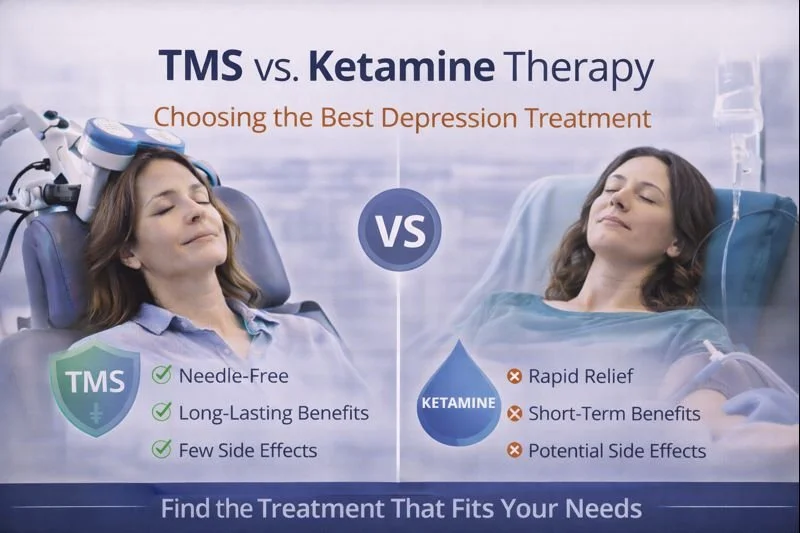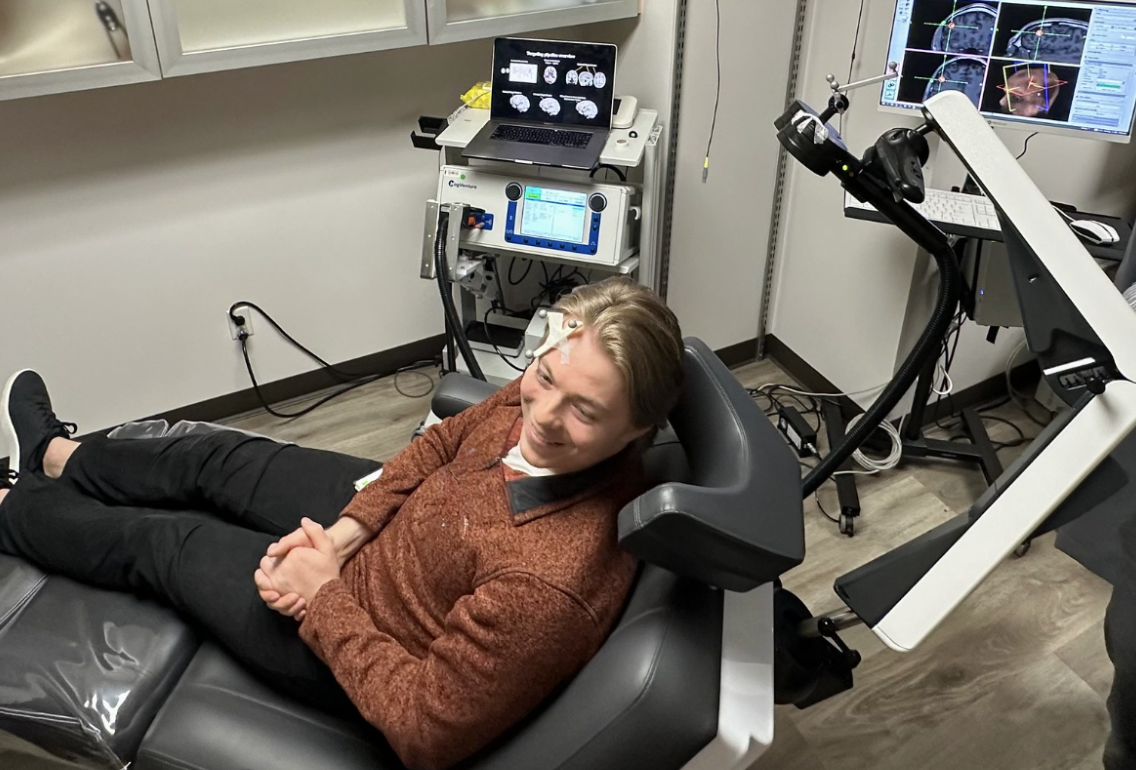TMS vs. Ketamine Therapy: Which One Is Right for Your Depression?
Understanding Your Options: TMS and Ketamine Therapy in Boston
If you're living in Brookline, Cambridge, Newton, Somerville, or Back Bay and struggling with treatment-resistant depression, you're not alone. Many people in the Greater Boston area seek effective alternatives when traditional medications and therapy don't provide enough relief.
Two of the most innovative treatments today are Transcranial Magnetic Stimulation (TMS) and Ketamine Therapy. Both offer hope for those battling depression, but they work in very different ways.
At Dignity Brain Health, a leading provider of TMS therapy in Brookline, MA, we often hear this question:
“TMS vs. Ketamine therapy — which one is right for me?”
This guide will walk you through each treatment, answer common patient concerns, and help you make an informed decision — all tailored to your needs right here in the Boston area.
What Is TMS Therapy?
Transcranial Magnetic Stimulation (TMS) is a non-invasive, FDA-approved treatment for major depressive disorder (MDD), especially when medications haven't worked.
How TMS Works
TMS uses magnetic pulses to stimulate specific areas of the brain involved in mood regulation.
Treatments are delivered through a coil placed gently on your scalp.
Sessions are typically 20–40 minutes, five days a week, for 4–6 weeks.
Benefits of TMS
Non-invasive: No anesthesia or sedation needed
Minimal side effects: Most patients only experience mild scalp discomfort
Drug-free: Ideal if you're tired of medication side effects
Long-lasting relief: Many patients report sustained improvement
Is TMS Effective?
Yes. Studies show that TMS can reduce symptoms in 50–60% of patients with treatment-resistant depression, with 30–40% achieving full remission (Carpenter et al., 2012).
What Is Ketamine Therapy?
Ketamine therapy involves administering low doses of ketamine — a dissociative anesthetic — either via IV infusion, nasal spray (Spravato), or lozenge.
How Ketamine Works
Ketamine targets glutamate, a neurotransmitter involved in brain plasticity.
It can create rapid antidepressant effects, sometimes within hours.
Benefits of Ketamine
Fast-acting: Some patients feel relief within 1–2 sessions
Effective for suicidality: May reduce suicidal thoughts quickly
Alternative mechanism: Works differently from SSRIs or SNRIs
Is Ketamine Effective?
Clinical trials show ketamine's rapid antidepressant effect is promising, especially in treatment-resistant cases (Aan Het Rot et al., 2012). However, ongoing treatment is often necessary, and long-term effects are still being studied.
TMS vs. Ketamine: Side-by-Side Comparison
How to Decide: Key Questions to Ask Yourself
Before choosing a treatment, consider:
How quickly do you need relief?
If you’re in acute distress or experiencing suicidal thoughts, Ketamine may offer faster results.Are you comfortable with medication-based treatments?
If not, TMS offers a drug-free, non-invasive option.Do you want a long-term solution?
Many TMS patients experience lasting results after just one round of treatment.Do you have specific health conditions?
Talk with your provider about your full medical history to determine which therapy is safer for you.
Local Resources and Support in Greater Boston
Living in the Boston area gives you access to some of the nation’s top mental health resources:
Dignity Brain Health in Brookline, MA
McLean Hospital (Belmont, MA) — Affiliated with Harvard Medical School
Why Choose Dignity Brain Health for TMS Therapy in Brookline, MA?
We specialize in personalized, evidence-based TMS treatments for patients throughout the Greater Boston area. Located in Brookline, we’re easily accessible from:
Cambridge (via Route 2 or the Red Line)
Newton (via Beacon Street or Commonwealth Ave)
Somerville (via the Green Line or Route 90)
Back Bay (minutes away via public transit)
What Sets Us Apart
Harvard-trained psychiatrists and technicians
Comfortable, welcoming clinic environment
Collaborative treatment planning
Transparent insurance and financing options
📍 Find us here:
Dignity Brain Health - TMS Therapy Clinic
Book Your Consultation Today
Still wondering which therapy is right for you? The best way to find out is to schedule a free consultation with our team.
✅ Personalized recommendations
✅ Insurance verification
✅ No obligation to commit
Conclusion: TMS or Ketamine? You Have Options in Boston
Whether you're considering the fast-acting relief of Ketamine or the long-term benefits of TMS, Boston offers access to world-class care. And right here in Brookline, Dignity Brain Health is ready to help you find hope and healing.
Take the next step. You deserve to feel better — and we’re here to guide you.
References
Aan Het Rot, M., Zarate, C. A., Jr, Charney, D. S., & Mathew, S. J. (2012). Ketamine for depression: where do we go from here?. Biological psychiatry, 72(7), 537–547. https://doi.org/10.1016/j.biopsych.2012.05.003
Carpenter, L. L., Janicak, P. G., Aaronson, S. T., Boyadjis, T., Brock, D. G., Cook, I. A., Dunner, D. L., Lanocha, K., Solvason, H. B., & Demitrack, M. A. (2012). Transcranial magnetic stimulation (TMS) for major depression: a multisite, naturalistic, observational study of acute treatment outcomes in clinical practice. Depression and anxiety, 29(7), 587–596. https://doi.org/10.1002/da.21969
Zarate, C. A., Jr, Singh, J. B., Carlson, P. J., Brutsche, N. E., Ameli, R., Luckenbaugh, D. A., Charney, D. S., & Manji, H. K. (2006). A randomized trial of an N-methyl-D-aspartate antagonist in treatment-resistant major depression. Archives of general psychiatry, 63(8), 856–864. https://doi.org/10.1001/archpsyc.63.8.856
—
CONTACT INFO:
DIGNITY BRAIN HEALTH
1101 BEACON STREET, SUITE 8W
BROOKLINE, MA, 02446
UNITED STATES
Phone: (617) 855-7288



